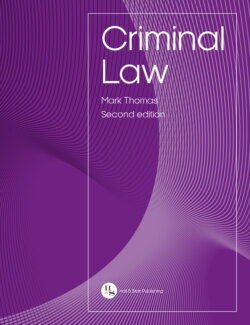Читать книгу Criminal Law - Mark Thomas - Страница 50
На сайте Литреса книга снята с продажи.
1.8Nature of criminal liability
Оглавление‘Actus non facit reum nisi mens sit rea.’
Interpreted by Lord Hailsham LC in Haughton v Smith [1975] AC 476 as meaning ‘[a]n act does not make a man guilty of a crime, unless his mind be also guilty’, this Latin maxim is the cornerstone of English criminal law.
Lord Hailsham LC went on to state that ‘It is thus not the actus which is reus but the man and his mind respectively.’ In basic form it means that in order for a defendant to be reus (Latin for ‘guilty’) of a criminal offence, they must complete an ‘act’ and also have the ‘intention’ to commit the act. Evil thoughts or bad intentions, therefore, are not sufficient to impose liability on an individual. They may, however, be used as evidence against him should he act on such thoughts.
The maxim does not tell the whole story though. There are certain offences where the need for a ‘guilty mind’ is unnecessary. These are generally known as ‘strict liability’ offences and often concern minor offences or offences that are regulatory in nature. We shall consider strict liability in greater detail in Chapter 3.
For the majority of crimes, there are three key elements that must be satisfied before a defendant can be liable for an offence. These are:
•actus reus;
•mens rea;
•no defence.
Figure 1.3 Elements of a criminal offence
Where a defendant is charged with a criminal offence and has pleaded not guilty, the prosecution is obligated to prove (beyond a reasonable doubt) that the defendant satisfied each element of the offence in question. This will involve proof of the actus reus, mens rea and a lack of defence. Failure to prove one of these elements (or a sub-element therein) will mean that the defendant is ‘not guilty’ or ‘not liable’ for the offence in question.
We shall now consider each of these elements in brief detail before then developing these key concepts in their respective chapters.
in practice
The difference between ‘liability’ and ‘guilt’ is important. It is often expressed that if an individual is ‘liable’ for an offence, they are also ‘guilty’ of that offence. However, this is a misnomer. Whether an individual is liable is a question of both fact and law, observing the circumstances of the case. The police will identify an individual as ‘liable’ for an offence when charging them with such. The Crown Prosecution Service will identify an individual as ‘liable’ for an offence when it proceeds with the prosecution. However, neither of these parties will identify the ‘guilt’ of that individual; guilt (if contested) is to be determined by the arbiters of fact at trial (whether they be the jury or the magistrates). For the purposes of this text, therefore, we shall be referring only to whether an individual is ‘liable’ for a criminal offence (and you are advised to do the same in your own criminal work) – whether they are ‘guilty’ of that offence or not is out of our hands.
